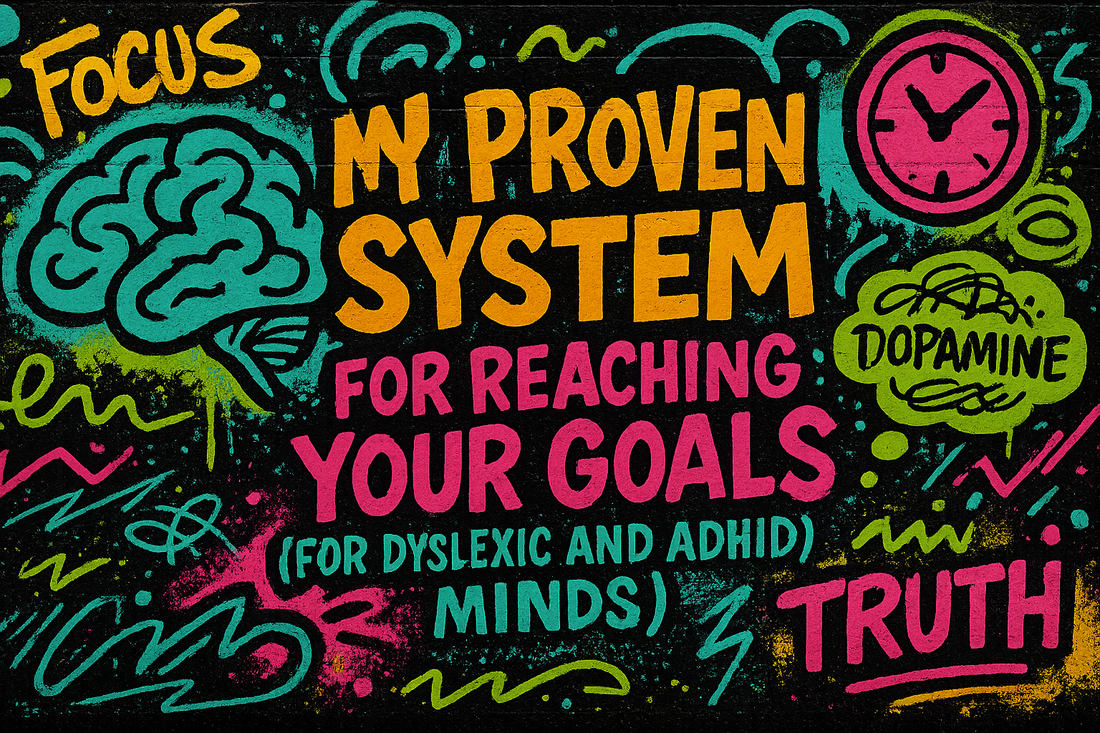
My Proven System For Reaching Your Goals (for Dyslexic And Adhd Minds)
Share
Have you ever felt like your brain was forcing you to pedal uphill in a race you never agreed to join? Many people with dyslexia or ADHD struggle with the weight of time and expectations. In the latest podcast episode, Stephen Martin explores why we sometimes feel stuck and how we can stop seeing our differences as flaws. He also shares a refreshing take on progress, burnout, and what it really means to commit to a journey.
In this chat, Stephen emphasises that we’re not lazy or broken. Instead, we process tasks differently, making it easy to underestimate how long it takes to translate ideas from our heads to the real world. He uses a powerful journey metaphor to explain why it’s more important to focus on direction than speed.
Embracing the Ups and Downs
No matter how motivated we are, life doesn’t always unfold at the pace we expect. For many adults with dyslexia and ADHD, even easy tasks can take unexpected turns. That’s usually where frustration creeps in. It’s not because we’re wrong or flawed, it’s just part of our wiring.
“You’re not broken,” says Stephen, “your brain operates in a different way, and that’s perfectly okay.”
This acceptance can be a huge relief. Once we realise we’re dealing with a different type of engine, we can learn to maintain it better. Maybe you’ve already tried rigid schedules and endless to-do lists without much success. Sometimes, the simplest shift is to give yourself room to breathe. Acknowledge that tasks might take longer, and that’s fine.
Why Direction Matters More Than Speed
Stephen introduces a journey metaphor, comparing our personal growth to travelling. Imagine you’re on a road trip through unfamiliar terrain. Every so often, the map you’re using feels out of date, or you take a wrong exit. You might even stall for a while because you’re second-guessing the route.
But here’s the catch: as long as you know where you want to end up, it doesn’t matter how fast you get there. Maybe you need extra stops. Perhaps you get distracted when a new idea pops up. That doesn’t mean it’s over—it just means you’ve got a unique route. If we were only focused on speed, we’d measure ourselves against everyone else on the road, which can lead to burnout and feelings of defeat.
Instead, Stephen encourages us to keep our eyes on the horizon. That might mean visualising the goal, making a commitment, and not beating ourselves up whenever we slow down or stop. Over time, direction—from where you are to where you want to be—trumps speed.
Breaking Down Unrealistic Expectations
Most of us have fallen into the “I should be faster” trap, only to find it zaps our energy. Neurodiverse minds can feel exhausted just juggling all the ideas floating around. There’s also the challenge of turning big thoughts into reality. It’s no surprise that frustration and burnout soon follow.
The moment you assume something’s simple, but it takes you triple the time, the self-criticism can start. Yet the truth is, unrealistic expectations are often more harmful than any perceived shortcomings. They set you up for a sense of failure or shame. Acceptance is a game-changer here. Rather than push yourself to the brink, ask, “What’s realistic for me?” and then plan accordingly.
Stephen reminds us that it’s better to maintain a steady, manageable pace than run flat out and collapse. It’s about finding a healthy rhythm and respecting your energy levels, especially when you have a creative brain that never stops generating ideas.
Reassessing Your Journey
Sometimes we get so caught up in daily tasks that we never pause to ask if we’re still on the right path. Goals can shift, or maybe the original destination wasn’t what we truly wanted. Checking in every now and then isn’t a setback—it’s a smart move.
Are you still excited about your goal, or has your heart moved elsewhere? If you do need to change course, you’ll waste less energy forcing yourself to stick to something that no longer fits. Stephen’s approach is that it’s never too late to adjust your route. Just be sure you spend some moments in reflection to confirm where you really want to go.
Whatever you do, don’t let distractions or negative self-talk pull you off track entirely. Take inventory, adjust your plan if needed, and embrace a sense of curiosity about what lies ahead. That’s all part of self-acceptance, which is vital when managing neurodiversity.
- “Tasks take longer, and that’s normal.”
- “Visualise your destination, not just the next mile.”
- “Sometimes, the slower path is the wiser one.”
- “Self-acceptance is everything.”
Key Takeaways
- You’re not broken—your mind simply works differently.
- Focus on direction over speed to avoid burnout.
- Visualise your goals to stay motivated on the journey.
- Unrealistic expectations breed frustration, so plan realistically.
- Pause to reassess your path and stay open to adjustments.
Ready to dive deeper? Listen to the full episode at the top of this page to hear Stephen’s personal experiences and advice on navigating life with dyslexia, ADHD, and other neurodiverse traits. If you’re looking for more resources, visit truthaboutdyslexia.com, join our Facebook group, or follow the RightSiders supplement journey. You’ll find a supportive community that’s all about embracing your true strengths.

